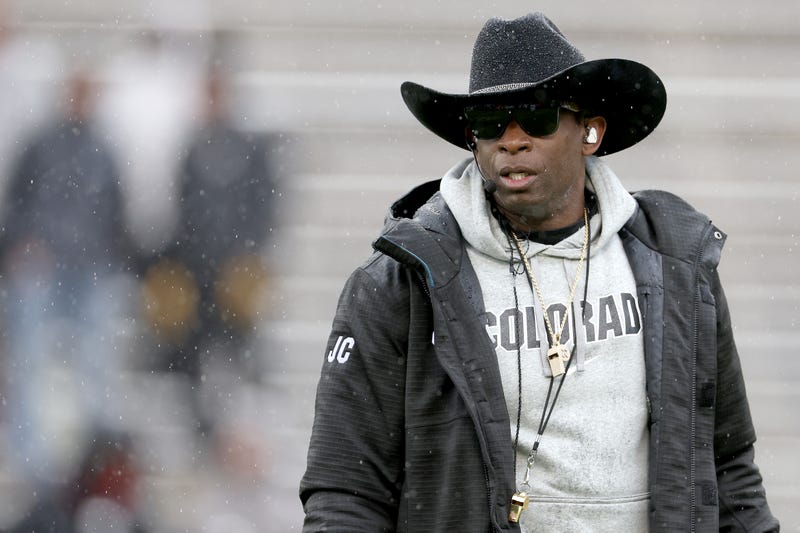
There's no doubt that Deion Sanders is one of the most polarizing figures in college football. And there's no doubt that Deion Sanders is polarizing intentionally. It's part of what makes Coach Prime the headlining act that he is, maybe more so than the players he instructs on and off of the field.
But there's something Sanders has forgotten in his time as the entertainer masquerading as a football coach that he is: when you're polarizing, when you divide the public in two, a good portion of the attention you get will be negative. And it's up to you to embrace and overcome that criticism, or be willing to face it head-on when you don't.
A day after the University of Colorado announced that it had banned Denver Post columnist Sean Keeler from asking questions about and to the team, fan reaction to the move has been split. Many feel the punishment is valid, and that Keeler's hyper-critical coverage of the team earned the permanent suspension. Others feel that Deion's behavior as coach has drawn justifiable criticism, and that if you're going to demand attention, you must take the good with the bad.
Count me in the group that believes the latter.
Colorado made the announcement citing "..a series of sustained, personal attacks on the football program and specifically on Coach Prime," while still permitting Keeler to cover the team in person and attend team functions. Amongst other criticisms, Keeler referred to Deion as "the Bruce Lee of B.S.," a "false prophet," and referred to the football program as a "circus."
Did Keeler go overboard in his criticism? It's subjective, to be certain. But remember: this is the same head coach that showed up on his first day with Louis Vuitton suitcases in hand, telling current Buffalo players that he was bringing his own luggage, and that most of them would need to jump in the transfer portal and find somewhere else to go. This is the same head coach that has yet to meet a TV cameraman he didn't like. This is the same head coach that spent quality time on College Gameday last year hawking sunglasses instead of promoting his program.
College football coaching isn't a one-size-fits-all job. What works for Coach A may not work for Coach Prime, and vice-versa. But there are some things that are just par for the course, and taking and responding to harsh criticism - even attacks - are one of those things.
Colorado banning Keeler may feel justified to many of you. But much like a President banning a particular news agency from covering press conferences, EVEN IF THAT SOURCE IS CLEARLY BIASED, it reeks of censorship. It smells like the person in charge isn't prepared for and doesn't have an answer for criticism, even if that criticism is intended to generate false outrage. And for Deion, that feels spot on.
Deion Sanders has accomplished nothing impressive during his time at Colorado. He rode the coattails of a couple of highly talented players - Travis Hunter and his son - to a couple of wins last year. And once the shine came off the apple and the game film was available to other coaches, Prime's team became bland, boring, and unsuccessful.
To some, it might feel like Deion is collecting a paycheck he hasn't earned, and sinking a program that was already having enough problems being successful. It feels to many like Deion conned his way into a major job, and is making life-after-Prime more difficult than it may have been for Buffalo fans. And when the storylines are more about Deion's antics than the growth and development of the football team, those criticisms are beyond valid.
The media, even attention-seeking columnists, are the voice of the fans. They are the only entity that can hold coaches accountable by demanding answers directly from them. The media is important, and their ability to cover a team and levy the questions fans want answered, is important. If a reporter steps over the line, or goes too far, or gets too insulting, it is up to the people they write for and the agencies they report to, to hold them accountable - not the subjects that they're writing about.
And so, banning the one reporter who was willing to stare down Deion and to ask questions while others (including one who asked Deion how important it was for people to have Aflac Insurance, a sponsor of Deion's, and another who asked about his birthday plans,) are allowed to talk about everything except them, certainly makes Deion come across as insecure, and potentially even afraid, of being asked the hard questions.
And if someone is afraid of being asked the tough questions, ordinarily, it's because they don't have the answers.
When Prime got the Colorado job, I asked the question: is Deion a good coach? Or is a a celebrity that was able to out-compete smaller schools because his celebrity attracted talent they didn't have access to?
This decision makes me think it's option number two. Deion has twelve games in front of him to prove me wrong.
But unless he spends more time improving his football team and less team getting into headbutting contests with reporters, I think the harsh criticisms and tough questions will only get louder.
I want Deion Sanders to be successful. College football is made better by personalities, by loud and colorful characters that give us a chance to connect with them.
But if you're not winning, you won't have the chance to let your personality shine through very long.
